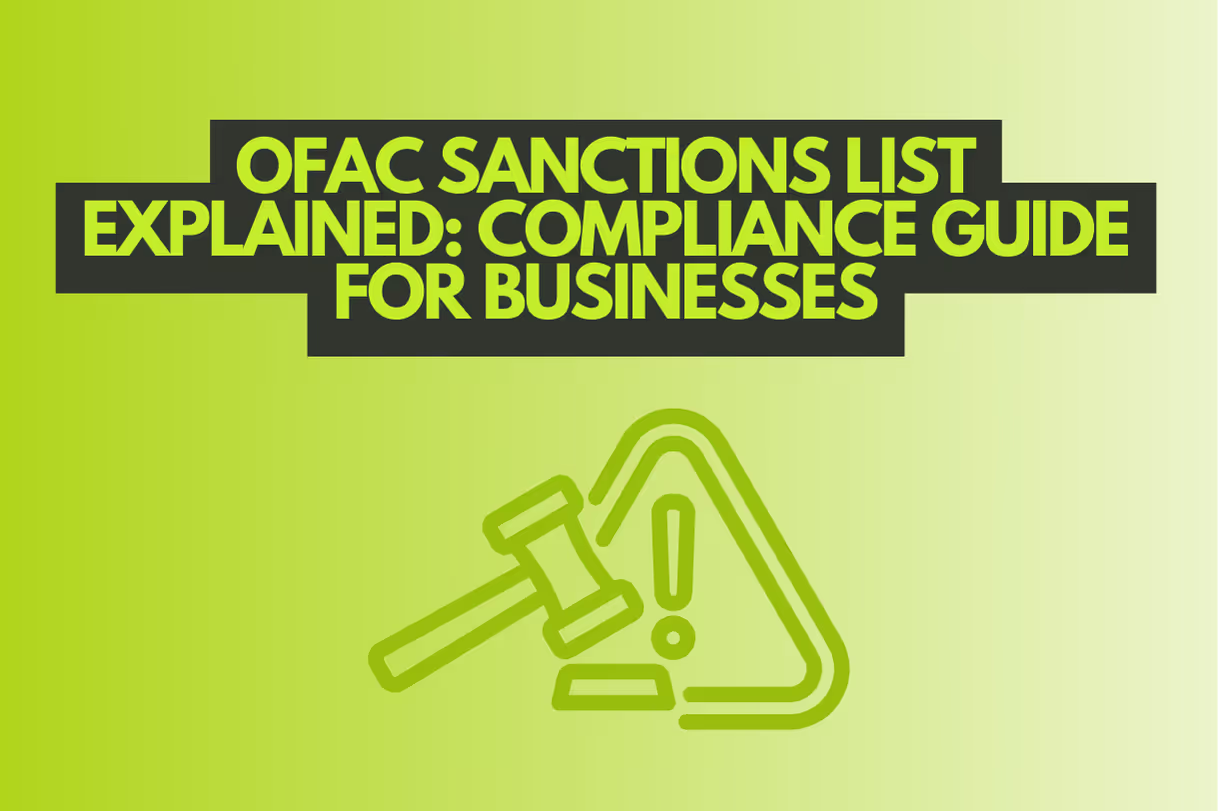
OFAC Sanctions List Explained: Compliance Guide for Businesses
Learn how the OFAC sanctions list impacts compliance, anti-money laundering, and financial crime prevention. Stay compliant with our guide.
The OFAC sanctions list is a critical component of U.S. regulations designed to protect national security and the financial system. For compliance teams, financial institutions, and multinational businesses, understanding and implementing sanctions screening is a fundamental step in financial crime prevention.
This guide breaks down the essentials of the OFAC sanctions list, its impact on anti-money laundering compliance, and how to integrate screening into your workflows.
What Is the OFAC Sanctions List?
The Office of Foreign Assets Control (OFAC), part of the U.S. Department of the Treasury, administers and enforces sanctions against:
- Countries and regimes
- Individuals and entities linked to terrorism
- Narcotics traffickers
- Weapons proliferators
- Human rights violators
The most well-known list is the Specially Designated Nationals (SDN) and Blocked Persons List, which prohibits U.S. persons from engaging in transactions with listed individuals or entities. In addition to the SDN list, OFAC manages sectoral sanctions and non-SDN lists that target specific industries and activities.
For an official source, compliance teams should regularly reference OFAC’s official sanctions lists.
Why the OFAC Sanctions List Matters for Compliance
Failure to comply with the OFAC sanctions list carries serious consequences that extend far beyond financial penalties. Regulators take sanctions violations extremely seriously, and businesses that fail to implement effective screening processes face risks across multiple dimensions:
Severe Financial Penalties
OFAC has the authority to impose civil penalties reaching millions of dollars per violation. For example, financial institutions have faced penalties exceeding hundreds of millions for inadequate screening controls. These fines not only impact profitability but can also trigger increased regulatory scrutiny for years afterward.
Criminal Liability
In cases of willful misconduct, individuals and organizations may face criminal charges. This can include significant prison sentences for executives or employees who knowingly facilitate transactions with sanctioned parties. For businesses, criminal liability creates lasting operational and reputational damage.
Reputational Damage
Even when violations are unintentional, the reputational fallout can be devastating—particularly for banks, payment providers, and multinational corporations. A single OFAC enforcement action can erode stakeholder trust, damage client relationships, and result in loss of partnerships with other regulated entities.
Operational Risks
Sanctions violations can also disrupt day-to-day business operations. Companies may face frozen transactions, blocked assets, and interrupted supply chains when counterparties are flagged as sanctioned entities. This creates inefficiencies, contractual disputes, and in some cases, long-term loss of market access.
Integration with Broader AML Obligations
Compliance with the OFAC sanctions list is an essential component of anti-money laundering compliance programs. Effective sanctions screening helps businesses identify and avoid transactions linked to terrorism, corruption, or organized crime. By embedding OFAC compliance into broader financial crime prevention strategies, organizations can safeguard their operations, maintain regulatory trust, and align with international compliance standards.
How to Integrate OFAC Sanctions Screening into Compliance Programs
Compliance with the OFAC sanctions list is not just about ticking boxes; it requires a structured, proactive approach. Organizations that integrate sanctions screening into their broader anti-money laundering compliance programs significantly reduce the risk of fines, reputational damage, and exposure to illicit actors. Below are four key pillars of an effective sanctions compliance framework.
1. Assess Your Risk Exposure
Every organization should begin by conducting a comprehensive risk assessment to understand where sanctions vulnerabilities may exist. Transactions, partnerships, and customer relationships must be carefully evaluated to identify potential exposure.
High-risk sectors—such as banking, international trade, shipping, and technology—face elevated threats due to their global reach and the complexity of cross-border transactions. For example, a shipping company that partners with overseas suppliers must ensure none of its counterparties appear on the OFAC sanctions list or other global watchlists.
By mapping out where risks lie, compliance teams can tailor their controls to focus resources on the areas of greatest vulnerability, making financial crime prevention more efficient and targeted.
2. Automate Sanctions Screening
Manual screening is no longer sufficient in today’s regulatory environment. The sheer volume of customers, transactions, and counterparties makes automation a necessity. Compliance teams should deploy technology-driven screening solutions that compare names and entities against the OFAC sanctions list, as well as other lists maintained by the EU, UN, and UK.
Automated solutions not only improve accuracy but also help reduce false positives, which often drain compliance resources. They also enable real-time alerts, allowing businesses to block suspicious transactions before they are executed—an essential safeguard for anti-money laundering compliance.
3. Monitor Continuously
Sanctions lists are not static; the OFAC sanctions list is updated frequently as new individuals, entities, and regimes are designated or removed. This means a one-time check at customer onboarding is insufficient.
Organizations must adopt continuous monitoring processes that ensure transactions and counterparties are screened against the most up-to-date lists. Without this, businesses run the risk of inadvertently engaging with newly sanctioned parties, exposing themselves to significant regulatory and operational consequences.
Continuous monitoring strengthens a company’s financial crime prevention framework, ensuring that compliance is not reactive but consistently proactive.
4. Maintain Records and Audit Trails
Regulators expect to see clear documentation of compliance efforts. This includes detailed logs of screening activity, escalations, decisions, and any remedial actions taken.
Maintaining strong audit trails demonstrates to regulators that your organization has robust processes in place and can withstand scrutiny in the event of an investigation. It also protects the business if questioned by banking partners or counterparties.
In practice, this means compliance teams should store evidence of all matches, reviews, and final decisions in a centralized, easily retrievable system. A well-documented process not only reduces regulatory risk but also instills confidence in customers, partners, and internal stakeholders.
{{snippets-guide}}
Best Practices for Compliance Teams
Building a robust sanctions compliance program requires more than just screening names against the OFAC sanctions list. To stay ahead of regulatory expectations and reduce operational risk, compliance teams should adopt the following best practices:
Stay Updated with OFAC Alerts
The OFAC sanctions list is updated frequently - sometimes several times a week. New individuals, entities, and even entire sectors can be added without notice. Businesses that rely on outdated data run the risk of engaging with sanctioned parties, leading to violations.
To mitigate this, organizations should subscribe directly to OFAC email alerts and RSS feeds, ensuring that updates are integrated immediately into their compliance systems. This real-time synchronization reduces the likelihood of missed matches and helps teams maintain continuous compliance.
Use Advanced Technology for Screening
Traditional sanctions screening tools often generate a high number of false positives, creating unnecessary workload for compliance analysts. By implementing AI-powered matching and natural language processing (NLP) technologies, businesses can improve accuracy and focus on genuine risks.
Modern solutions not only screen against the OFAC sanctions list but also incorporate global watchlists from the EU, UN, and UK. They can recognize variations in spelling, transliterations, and aliases, which are common challenges in sanctions screening. By accelerating investigations and improving precision, technology strengthens both anti-money laundering compliance and broader financial crime prevention strategies.
Educate and Train Staff
Even the best technology requires knowledgeable human oversight. Regular staff training ensures that compliance teams understand sanctions obligations, escalation procedures, and reporting requirements.
Training should also extend to frontline employees—such as relationship managers or payment processing staff—who may be the first to detect red flags. By building a culture of compliance, organizations reduce the risk of oversight and demonstrate to regulators that they take sanctions enforcement seriously.
Think Globally, Not Just Locally
While the OFAC sanctions list is one of the most widely enforced regulatory tools worldwide, multinational businesses must also comply with sanctions regimes issued by the European Union, United Nations, and United Kingdom.
In some cases, these frameworks overlap; in others, they diverge. For example, an entity sanctioned by the EU may not appear on the OFAC list, but dealing with them could still carry legal and reputational risks. Adopting a global sanctions compliance strategy ensures consistent standards across jurisdictions and minimizes the chance of regulatory conflict.
Strengthen Governance with the Three Lines of Defense
A successful sanctions compliance program requires strong governance and accountability. For a deeper dive into organizational frameworks, see our guide on the Three Lines of Defense. This model clarifies the responsibilities of operational staff, compliance oversight, and internal audit—ensuring that sanctions compliance is embedded across the organization rather than siloed within one team.
How sanctions.io Supports OFAC Compliance
At sanctions.io, we provide:
- Real-time access to the OFAC sanctions list and other global watchlists
- High-performance screening APIs that minimize false positives
- Automated monitoring for ongoing compliance
- Easy integration into existing AML and KYC workflows
By combining efficiency with regulatory reliability, sanctions.io helps businesses strengthen both anti-money laundering compliance and overall financial crime prevention strategies.
{{snippets-case}}
Conclusion: The OFAC Sanctions List
The OFAC sanctions list is a safeguard against illicit activity and a cornerstone of effective financial crime prevention. Businesses that understand its scope and adopt automated, reliable screening processes are better positioned to reduce risk and protect their reputation.
With sanctions.io, staying compliant with OFAC and global sanctions frameworks becomes straightforward, scalable, and effective.
sanctions.io is a highly reliable and cost-effective solution for real-time screening. AI-powered and with an enterprise-grade API with 99.99% uptime are reasons why customers globally trust us with their compliance efforts and sanctions screening needs.
To learn more about how our sanctions, PEP, and criminal watchlist screening service can support your organization's compliance program: Book a free Discovery Call.
We also encourage you to take advantage of our free 7-day trial to get started with your sanctions and AML screening (no credit card is required).



